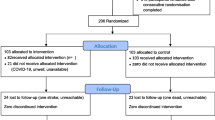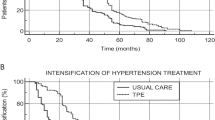Abstract
OBJECTIVE: Self-management education, supported by multidisciplinary health care teams, is essential for optimal diabetes management. We sought to determine whether acute diabetes complications or quality of care differed for patients in routine clinical care when their self-management education was delivered through group diabetes education classes versus individual counselling.
METHODS: With the use of population-level administrative and primary data, all diabetic patients in Ontario who attended a self-management education program in 2006 were identified and grouped according to whether they attended group classes (n=12,234), individual counselling (n=55,761) or a mixture of both (n=9,829). Acute complications and quality of care in the following year were compared among groups.
RESULTS: Compared with those attending individual counselling, patients who attended group classes were less likely to have emergency department visits for hypo/hyperglycemia (odds ratio 0.54, 95% confidence interval [CI]: 0.42–0.68), hypo/hyperglycemia hospitalizations (OR 0.49, CI: 0.32–0.75) or foot ulcers/cellulitis (OR 0.64, CI: 0.50–0.81). They were more likely to have adequate HbA1c testing (OR 1.10, CI: 1.05–1.15) and lipid testing (OR 1.25, CI: 1.19–1.32), and were more likely to receive statins (OR 1.22, CI: 1.07–1.39).
CONCLUSION: Group self-management education was associated with fewer acute complications and some improvements in processes of care. Group sessions can offer care to more patients with reduced human resource requirements. With increased pressure to find efficiencies in health care delivery, group diabetes education may provide an opportunity to deliver less resource-intensive care that simultaneously improves patient care.
Résumé
OBJECTIF: Une éducation à l’auto-prise en charge, appuyée par une équipe de soins de santé multidisciplinaire, est essentielle à une prise en charge optimale du diabète. Nous avons cherché à déterminer si les complications aiguës du diabète ou la qualité des soins diffèrent chez les patients recevant les soins cliniques habituels lorsque leur éducation à l’auto-prise en charge leur est offerte en groupe dans des classes d’éducation au diabète, plutôt que sous forme de counseling individuel.
MÉTHODE: À l’aide de données primaires et administratives populationnelles, nous avons identifié tous les patients diabétiques de l’Ontario ayant assisté à un programme d’éducation à l’auto-prise en charge en 2006 et nous les avons regroupés selon qu’ils ont assisté à des classes en groupe (n=12 234), reçu du counseling individuel (n=55 761) ou un mélange des deux (n=9 829). Nous avons comparé les complications aiguës et la qualité des soins au cours de l’année suivante dans ces trois groupes.
RÉSULTATS: Comparativement à ceux qui ont reçu du counseling individuel, les patients ayant assisté à des classes en groupe étaient moins susceptibles de s’être rendus à l’urgence pour cause d’hypo- ou d’hyperglycémie (rapport de cotes 0,54, intervalle de confiance de 95 % [IC]: 0,42–0,68), d’être hospitalisés pour hypo- ou hyperglycémie (RC 0,49, IC: 0,32–0,75) ou de souffrir de plaies du pied ou de cellulite (RC 0,64, IC: 0,50–0,81). Ils étaient aussi plus susceptibles d’avoir fait faire un test d’HbA1c (RC 1,10, IC: 1,05–1,15) et un bilan lipidique (RC 1,25, IC: 1,19–1,32), et plus susceptibles de recevoir des statines (RC 1,22, IC: 1,07–1,39).
CONCLUSION: L’éducation à l’auto-prise en charge reçue en groupe était associée à un moindre nombre de complications aiguës et à certaines améliorations du processus de soins. Les séances en groupe permettent de servir davantage de patients et exigent moins de ressources humaines. Étant donné les pressions accrues pour réaliser des économies dans la prestation des soins de santé, l’éducation au diabète en groupe peut être l’occasion d’offrir des services avec moins de ressources tout en améliorant les soins aux patients.
Similar content being viewed by others
References
Cheng YJ, Imperatore G, Geiss LS, Wang J, Saydah SH, Cowie CC, et al. Secular changes in the age-specific prevalence of diabetes among U.S. adults: 1988–2010. Diabetes Care 2013;36(9):2690–96.
Lipscombe LL, Hux, JE. Trends in diabetes prevalence, incidence, and mortality in Ontario, Canada 1995–2005: A population-based study. Lancet 2007;369(9563):750–56.
Stewart AL, Greenfield S, Hays RD, Wells K, Rogers WH, Berry SD, et al. Functional status and well-being of patients with chronic conditions. Results from the Medical Outcomes Study. JAMA 1989;262(7):907–13.
Gregg EW, Gu Q, Cheng YJ, Narayan KMV, Cowie, CC. Mortality trends in men and women with diabetes, 1971 to 2000. Ann Intern Med 2007;147(3):149–55.
Gæde P, Vedel P, Larsen N, Jensen GVH, Parving HH, Pedersen O. Multifactorial intervention and cardiovascular disease in patients with type 2 diabetes. N Engl J Med 2003;348(5):383–93.
Gæde P, Lund-Andersen H, Parving HH, Pedersen O. Effect of a multifactorial intervention on mortality in type 2 diabetes. N Engl J Med 2008;358(6):580–91.
Newman S, Steed L, Mulligan K. Self-management interventions for chronic illness. Lancet 2004;364(9444):1523–37.
American Diabetes Association. Standards of medical care in diabetes-2013. Diabetes Care 2013;36(Suppl 1):S11–S66.
Chodosh J, Morton SC, Mojica W, Maglione M, Suttorp MJ, Hilton L, et al. Meta-analysis: Chronic disease self-management programs for older adults. Ann Intern Med 2005;143(6):427–38.
Rickheim P, Weaver TW, Flader J, Kendall D. Assessment of group versus individual diabetes education: A randomized study. Diabetes Care 2002;25(2):269–74.
Duke SA, Colagiuri S, Colagiuri R. Individual patient education for people with type 2 diabetes mellitus. Cochrane Database Syst Rev 2009;(1).
Trento M, Passera P, Borgo E, Tomalino M, Bajardi M, Brescianini A, et al. A 3-year prospective randomized controlled clinical trial of group care in type 1 diabetes. Nutr Metab Cardiovasc Dis 2005;15(4):293–301.
Trento M, Passera P, Borgo E, Tomalino M, Bajardi M, Cavallo F, et al. A 5-year randomized controlled study of learning, problem solving ability, and quality of life modifications in people with type 2 diabetes managed by group care. Diabetes Care 2004;27(3):670–75.
Dinneen SF, O’Hara MC, Byrne M, Smith D, Courtney CH, McGurk C, et al. Group follow-up compared to individual clinic visits after structured education for type 1 diabetes: A cluster randomised controlled trial. Diabetes Res Clin Pract 2013;100(1):29–38.
Kulzer B, Hermanns N, Reinecker H, Haak T. Effects of self-management training in type 2 diabetes: A randomized, prospective trial. Diabet Med 2007;24(4):415–23.
Hux JE, Ivis F, Flintoft V, Bica A. Diabetes in Ontario: Determination of prevalence and incidence using a validated administrative data algorithm. Diabetes Care 2002;25(3):512–16.
Cauch-Dudek K, Victor JC, Sigmond M, Shah, BR. Disparities in attendance at diabetes self-management education programs after diagnosis in Ontario, Canada: A cohort study. BMC Public Health 2013;13:85.
Austin PC, Shah BR, Newman A, Anderson, GM. Using the Johns Hopkins’ Aggregated Diagnosis Groups (ADGs) to predict 1-year mortality in population-based cohorts of patients with diabetes in Ontario, Canada. Diab Med 2012;29(9):1134–41.
Steele LS, Glazier RH, Lin E, Evans M. Using administrative data to measure ambulatory mental health service provision in primary care. Med Care 2004;42(10):960–65.
Hubbard AE, Ahern J, Fleischer NL, Van der Laan M, Lippman SA, Jewell N, et al. To GEE or not to GEE: Comparing population average and mixed models for estimating the associations between neighborhood risk factors and health. Epidemiology 2010;21(4):467–74.
Steinsbekk A, Rygg LØ, Lisulo M, Rise MB, Fretheim A. Group based diabetes self-management education compared to routine treatment for people with type 2 diabetes mellitus: A systematic review with metaanalysis. BMC Health Serv Res 2012;12:213.
Author information
Authors and Affiliations
Corresponding author
Additional information
Acknowledgements: This research was funded by an operating grant from the Physicians’ Services Incorporated Foundation of Ontario and by the Chronic Diseases division of the Ontario Ministry of Health and Long-Term Care (MOHLTC). Dr. Shah receives salary support from the Canadian Institutes of Health Research. The Institute for Clinical Evaluative Sciences (ICES) is a non-profit research institute funded by the MOHLTC. The opinions, results and conclusions reported in this study are those of the authors and are independent of the funding sources. No endorsement by ICES or the MOHLTC is intended or should be inferred.
Conflict of Interest: None to declare.
Rights and permissions
About this article
Cite this article
Hwee, J., Cauch-Dudek, K., Victor, J.C. et al. Diabetes education through group classes leads to better care and outcomes than individual counselling in adults: A population-based cohort study. Can J Public Health 105, e192–e197 (2014). https://doi.org/10.17269/cjph.105.4309
Received:
Accepted:
Published:
Issue Date:
DOI: https://doi.org/10.17269/cjph.105.4309




